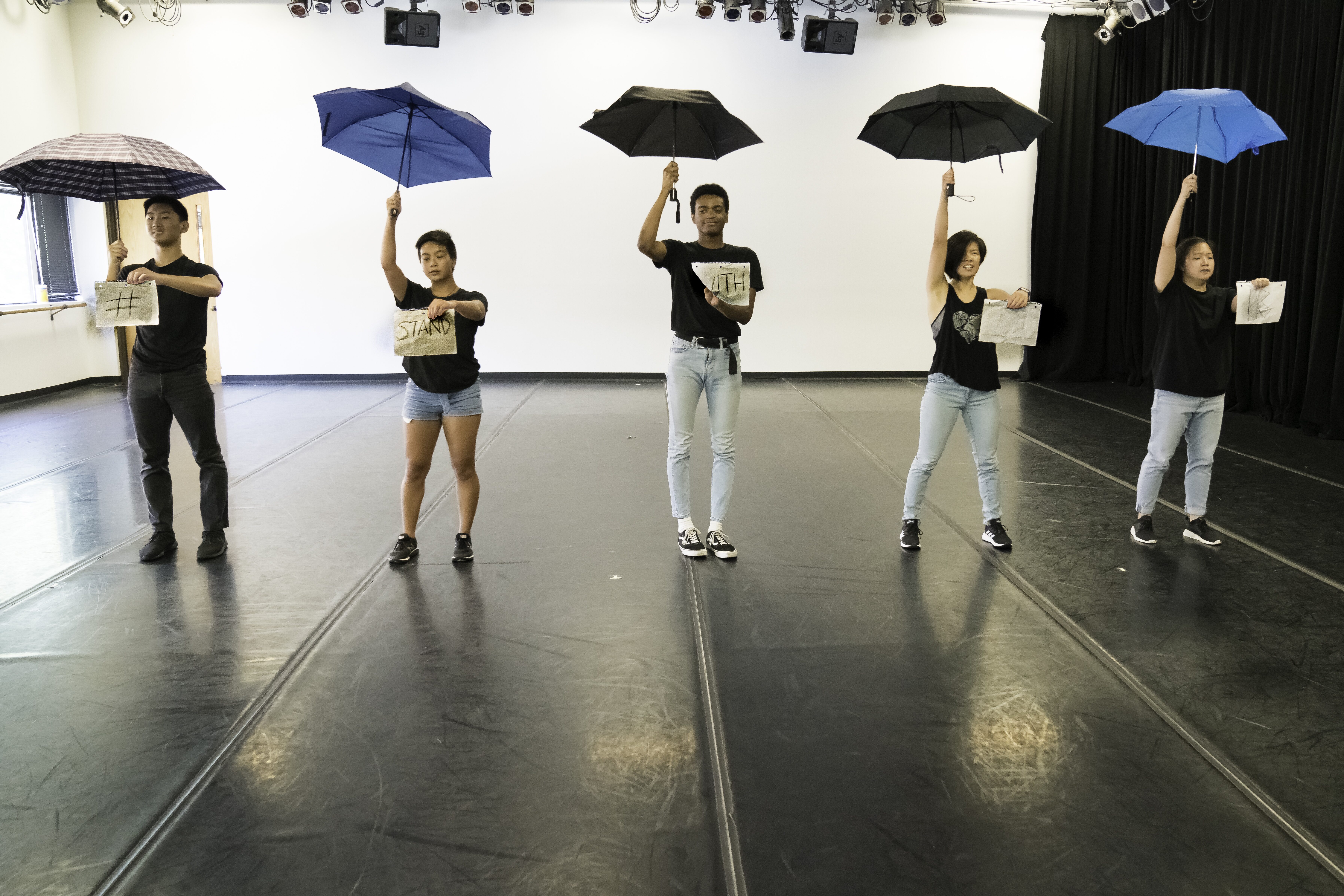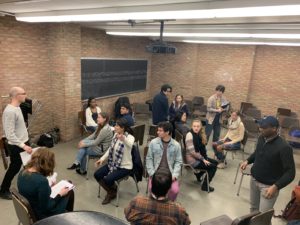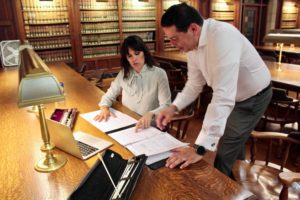
Now by Sherry Lin (MFA dance student) was performed last summer at the Detroit Dance City Festival and used the platform to raise awareness and stand in solidarity with the protesters fighting against Chinese governmental influence in Hong Kong. Dancers: Victoria Briones, Sherry Lin, Chris Underwood, Kevin Wang, Emma Zordan. Photo Credit: Kirk Donaldson
Late on a Monday night in a modest classroom with a grand piano, staff-lined chalkboards, and a steady stream of faint melodies from adjacent music rooms coursing into the space, students rearrange desks into a circle to initiate a discussion on how to approach their art through the lens of community engagement and social action.
Through this mini-course, students engage with difficult questions facing artists: how do theatre, dance, music and interdisciplinary art forms offer critical sites for transforming cultural and social structures within society? and: What are the tools needed to harness the power of the performing arts to impact social change?
This is ARTSADMN 406: Art as Social Action: Realizing Impact Through Community-Driven Performance, a collaboration between the School of Social Work and The School of School of Music Theatre & Dance sponsored by the Excel Lab.

Marc Author leads students in the ARTSADMN 406: Art as Social Action: Realizing Impact Through Community-Driven Performance course.
The class, taught by Post-Doctoral Research Fellow Marc Arthur, encourages students to analyze how they can contextualize their artistic aspirations within the current sociocultural landscape, giving them concrete skills in how to facilitate community partnerships, align their art for positive social justice and engage diverse communities. The new course was developed by Arthur to immerse students in art-based social justice and has been heavily influenced by Arthur’s own research and experiences as an artist.
“The class emerged out of my current book project which looks at how theatre and performance has shifted the narrative of the AIDS pandemic,” said Arthur, “It also stems from a few different projects I’m working on in the School of Social Work as part of my Postdoctoral Fellowship, including a study that examines how performance can be used to achieve social justice.”
Students in the mini-course came from an amalgam of academic backgrounds in and out of the SMTD school — from composition and voice performance to business and education, a mixed seminar of undergraduates and master’s students — with many having a desire to utilize their talents as makers towards making a difference.
BBA senior and acting minor Sachit Grover wants to gain a new perspective on how artists can work towards social equity, especially as he creates short films on major social issues. Grover plans on utilizing the skills and ideas fostered in this course in his future plans to move to Mumbai, India and work in the Bollywood industry.
“My main motivation to take this course is my interest in using acting and entertainment as a means of raising awareness on social issues,” Grover said, “This class will be extremely important in helping me make a notable social change across a nation [India] with immense poverty through the medium of entertainment.”
Fine Arts Junior Sophia Schwartz is excited for what this mini-course has to offer after joining the Art-Based Social Justice Collective last semester, which Arthur co-facilitates.
“I think that this course will help me in many ways,” Schwartz said, “I am eager to expand my understanding of the intersection of art and social justice. […] I think that my ability to analyze the impacts of art will be strengthened and I hope that I will be better equipped to make and facilitate art that is socially engaged.”

Maria Castillo Rodriguez, a doctoral student in the Excel class, started the Latin American Music Initiative last year with Regulo Stabilito (both pictured).
Learning the tools needed to advance performing arts in a sustainable and socially applicable way has become a necessity for modern artists to build sustainable careers, and this need has been realized by this course and other initiatives through the Excel Lab. SMTD’s Excellence in Entrepreneurship, Career Empowerment & Leadership (EXCEL) Lab is attempting to answer the question of how institutions can work with rising artists to ensure they are properly equipped with the skills they need to succeed in their careers by offering “comprehensive access to skill-building, mentorship, and funding to help make [student] dreams a reality.”
Excel’s offerings includes available courses such as Arthur’s, student venture and project funding and grants up to $100,000 per year, workshops and invited speakers, details on potential internships, and immersion experiences such as an opportunity to experience the behind-the-scenes of NYC’s Broadway and a sponsored CoLab Immersion in Trinity Laban Conservatoire in London. This resource for SMTD students is made possible by the Meta Weiser EXCEL Fund, a gift from retired Ambassador and current U-M Regent Ronald N. Weiser (BBA ‘66) and Eileen Weiser (MMus ‘75).
Initiatives through the Excel Lab such as courses like Arthur’s illuminate the capability artists have towards envisioning a better future for society, and the impact makers can have by translating experiences into art, then hopefully into change.
“I think that for me, one of the most powerful things about performance is the spirit of collaboration and co-creation […] that process in which theater allows you — really forces you — to think together and solve problems together,” said Arthur.
See upcoming events and initiatives sponsored by the Excel Lab here.


